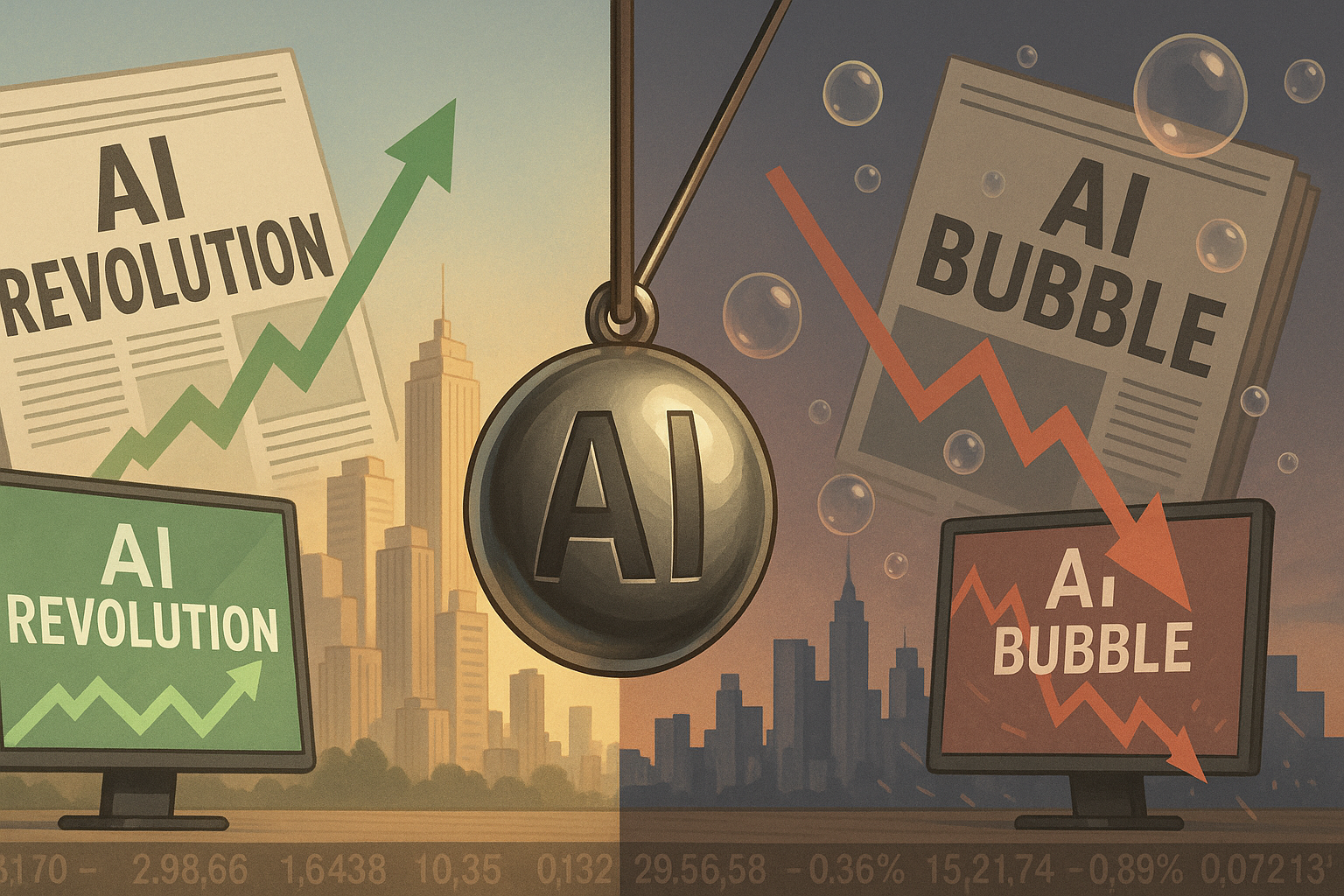Something bizarre happened in the financial world this month. AI—the unstoppable revolution that was reshaping humanity's future—suddenly became a "bubble" faster than you could say "market correction."
I've been tracking financial media narratives for years, and this one's a doozy. The shift happened with such synchronized precision around October 11th that it almost felt... orchestrated?
Before that date, try searching for "AI bubble" online. Go ahead, I'll wait. What you'll find is a smattering of academic papers, the occasional cautious columnist, maybe some Reddit threads where people wonder if we're getting ahead of ourselves.
Now filter for content after that date.
Suddenly, it's bubble talk everywhere. Bloomberg's warning about it. Bank of America's surveying about it. The Financial Times is hedging about it. Every analyst who was pounding the table on AI stocks is now clearing their throat and "adding nuance" to their positions.
What the hell happened?
The easy explanation points to Trump's Truth Social post that temporarily vaporized $2 trillion in market cap. But that doesn't actually explain the timing—most of these bubble proclamations came days later, after the market had already started recovering.
The real story (and this is something I've seen repeat itself throughout my career covering market psychology) is what I call the "Narrative Pendulum Cycle."
For nearly a year, AI enjoyed a protected status in financial discourse. You could express skepticism, sure, but only within carefully prescribed boundaries. The acceptable position was essentially: "AI might be overhyped short-term, but long-term, it's transformative." This created this weird dynamic where people could acknowledge potential overvaluation while simultaneously recommending increased exposure!
What changed wasn't the technology or even the market fundamentals. It was the permission structure.
Once major institutions deployed the B-word ("bubble") without immediate backlash, it created safe space for everyone else. Suddenly, all those financial journalists and analysts who'd been privately harboring doubts could express them openly.
Look, I'm not suggesting there's a smoke-filled room where market narratives get decided. It's more subtle than that. It's about collective psychology and the boundaries of acceptable discourse. And those boundaries can shift with remarkable speed.
I remember watching the exact same pattern during the housing boom in the mid-2000s. For years, questioning mortgage practices was career suicide for analysts... until suddenly, in what seemed like a matter of weeks, it became conventional wisdom. Same with dotcom stocks in 2000.
The fascinating thing about AI (unlike, say, pet-supply websites or NINJA loans) is that the core technology actually is revolutionary. This isn't Pets.com we're talking about.
The real question isn't whether AI matters. It's whether current valuations accurately reflect its near-term economic impact. And, well... many companies with hastily assembled "AI strategies" are essentially selling digital snake oil—tokens of potential future value with minimal substance behind them.
What happens next? If history is any guide (and it usually is, despite what tech evangelists claim), the pendulum will swing too far in the negative direction before finding equilibrium. That's just how these cycles work.
Some genuinely innovative AI companies will get unfairly lumped in with the pretenders. Venture funding will tighten. The media will overcompensate with tales of AI disappointment and abandoned projects.
And somewhere in that correction, the genuine opportunities will emerge for those who can separate signal from noise.
Is AI in a bubble? That's actually the wrong question to ask. (Though I suspect many readers clicked on this article expecting a simple yes/no answer. Sorry about that.)
The better question is: which specific AI applications and business models have sustainable value propositions, and which ones are merely riding the hype cycle? The companies that can answer that convincingly will survive whatever market gyrations lie ahead.
In the meantime, I'm watching with a mix of amusement and déjà vu as publications that spent months breathlessly chronicling AI's unstoppable ascent now solemnly warn us about its inevitable correction.
The technology may be revolutionary, but the financial narratives around it? Those follow patterns as old as markets themselves.
